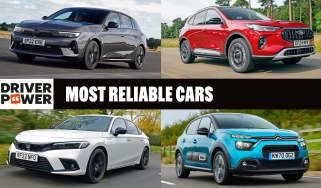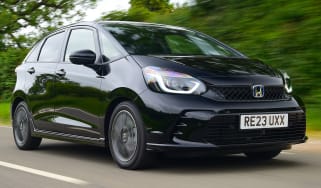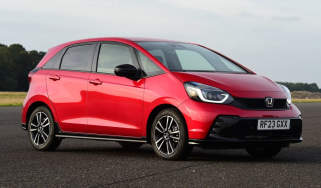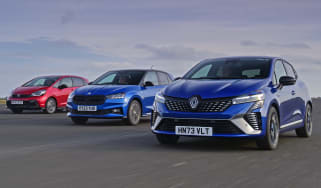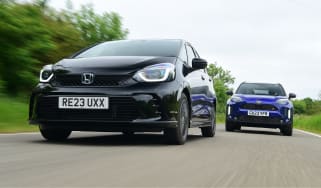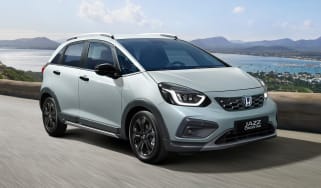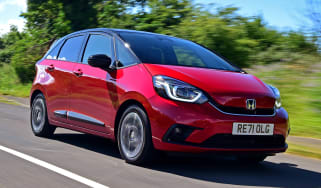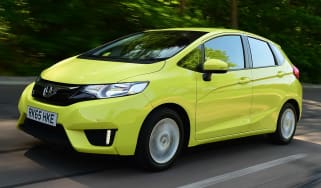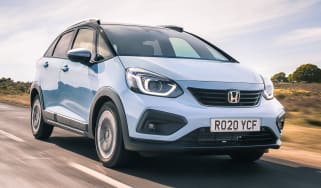Honda Jazz review: a sensible supermini, but it’s more costly than rivals
Practical, efficient and highly specced, the hybrid Honda Jazz supermini is an attractive if relatively pricey package

Quick review
The fourth-generation Honda Jazz aims to attract buyers interested in better fuel economy, up-to-date connectivity, and reasonable running costs. Does it succeed? For the most part, yes – and it should hold its value well, too.
On the downside, the Jazz is still a boxy, uninspiring shape and lacks the fun factor other rivals offer. Its infotainment system isn’t the best in this highly competitive class, either. However, the Japanese supermini’s hybrid powertrain is impressive, and if you prioritise practicality over style, it could be the right choice. Just remember to drive a hard bargain at the dealership on those high list prices.
Honda Jazz: price, specs and rivals
The Honda Jazz has been around since 2002 in the UK, and over the intervening years, its mix of practicality, reliability and low running costs has won a loyal band of repeat customers.
But the Jazz’s unassuming nature has made it hard to reach customers outside that loyal band of buyers who have homed in on the little Honda’s common-sense qualities.
The latest model introduced in 2020 is the fourth generation, and whereas in Japan it’s available with 1.3-litre petrol or 1.5-litre hybrid power, here in the UK, it’s the hybrid e:HEV variant that’s the only option. That decision is in line with Honda’s stated intention to eliminate conventional powertrains from its European line-up – something it has nearly achieved, with the Civic Type-R the sole petrol-only model in the Honda range.
Used - available now
Only offering hybrid power is similar to that of its rival, the Toyota Yaris. Like the Yaris, the Jazz allows for brief periods of electric-only driving – up to a mile, in fact. While that sounds insignificant, it really helps in stop/start city driving to save fuel.
While clever hybrid tech has environmental benefits, the Jazz still has its work cut out to catch the attention of supermini buyers who want to drive something a little more fun or funky. The Jazz’s roster of rivals is impressively long, including big names such as the Renault Clio, Vauxhall Corsa, and Volkswagen Polo. There’s also the Polo’s fellow stablemates, the SEAT Ibiza and Skoda Fabia to consider, along with the likes of the Hyundai i20, Mazda 2 Hybrid, and Peugeot 208.
The latest Jazz comes to the fight with strong equipment levels across four model grades: Elegance, Advance, Advance Sport, and the SUV-inspired Crosstar Advance version. All versions come with plenty of equipment, getting 15-inch alloy wheels, a nine-inch central touchscreen with Apple CarPlay and Android Auto, climate control, front and rear parking sensors, and a reversing camera.
The mid-range Advance gets sat-nav, heated front seats and steering wheel, privacy glass and larger 16-inch alloy wheels. The Advance Sport adds to this with sport-inspired details to its body styling, a special exhaust finisher, ultrasuede interior trim, sports pedals, a three-spoke steering wheel, and a Sport drive mode – though the powertrain remains the same.
Honda introduced the Jazz Crosstar model in mid-2020 to sit alongside the regular five-door hatchback. It has a raised ride height, body cladding, and roof rails for a pseudo-4x4 look – just don’t expect any off-road ability because it lacks four-wheel drive. Based on the Advance-spec Jazz, it’s more expensive than the regular car and slightly less efficient. In our opinion, it’s out of step with the overall ethos of the Jazz, so we’d suggest you stick with the mid-range Advance trim instead.
Engines, performance and drive
The latest Honda Jazz has bypassed the recent trend for small-capacity turbocharged engines and gone straight to hybrid power. Called e:HEV, the system includes a 1.5-litre Atkinson-cycle petrol engine and two electric motors. A 2023 update bumped the total system power output from 106bhp to 120bhp.
There are three driving modes to make the most of the complex hybrid set-up. The EV mode runs the car solely on electric power, and this mode would normally be used when moving off from a standstill or when travelling at low speed. In Hybrid Drive, the petrol engine and electric motor work together to achieve optimum power and fuel economy, while the car will opt for Engine Drive mode at motorway cruising speeds, relying exclusively on the petrol engine.
The Jazz is really at its best at lower speeds, with its light steering making it well-suited to urban life, and we like that the Jazz tends to favour quiet electric drive in town from a refinement standpoint. We did notice that the Jazz can operate in EV mode at higher speeds, but you’ll need to be very gentle with the accelerator pedal in order to keep it in this mode.
It’s on a B road where the Jazz starts to lose ground to its rivals. When the road gets twisty, a Renault Clio feels fleet-footed, whereas the Jazz feels more ungainly in comparison. While nicely weighted, the steering in the Jazz isn’t as quick as the Clio’s, and feels lazier to respond to your inputs. And while the hybrid system in the Jazz has benefits at lower speeds, if you apply any more than two-thirds throttle at higher speeds, the CVT transmission sends the engine’s revs soaring, producing plenty of noise in the process.
0-62mph acceleration and top speed
The hybrid system in the Jazz produces 120bhp, allowing the Jazz to go from 0-62mph in 9.4 seconds – which is roughly the same time as a Renault Clio E-Tech. The Advance-spec cars take a little longer at 9.6 seconds, while the SUV-inspired Crosstar Advance model requires 9.7 seconds to complete the same benchmark sprint. The top speed for all models is 109mph.
Its hybrid system combines the efforts of a 1.5-litre petrol engine and two electric motors. One motor is designed to help with direct propulsion, while the other converts energy from the petrol engine into electricity, which can be used immediately to drive the Jazz or be stored in the car’s small 0.7kWh lithium-ion battery pack.
MPG, CO2 and running costs
The most efficient Honda Jazz is the Elegance trim, which gets 62.8mpg on the WLTP combined cycle. Advance and Advance Sport spec models achieve 61.4mpg, while the heavier Crosstar Advance model will return up to 58.9mpg.
We tested an earlier 106bhp version of the Jazz in now-superseded Sport trim as part of our twin test against the Toyota Yaris Cross, and found the Honda achieved an excellent 58.5mpg, which was significantly higher than the 48.7mpg we got from the Toyota Yaris Cross. Keep to lower speeds around town, and we reckon you could easily blow past the 60mpg mark in the Jazz.
The jacked-up Jazz Crosstar also proved to be very efficient when we tested it, returning 55.4mpg when we pitted it against the Dacia Sandero Stepway. That rival managed 44.3mpg in the same conditions.
The hybrid tech also ensures low emissions, with CO2 levels ranging from 102g/km to 108g/km, making the Jazz a more affordable company car choice than a traditional petrol supermini. The Toyota Yaris, with its lower 92g/km figure, is several Benefit-in-Kind (BiK) tax bands lower than the Jazz, though.
Insurance groups
Insurance premiums will potentially be higher than those of its supermini rivals. The Jazz range falls into either groups 21 or 22 (with the Advance Sport and Crosstar Advance in group 22), while for comparison, the recently facelifted 143bhp Renault Clio E-Tech will be cheaper to insure because it sits in group 15.
Check any car's MoT history in a few easy clicks with our MoT checker tool...
Depreciation
Residual values for the Honda Jazz are relatively strong, the car retaining between 51 and 53 per cent over a three-year/36,000-mile ownership period, according to our expert data. That’s on par with the Renault Clio, but if you want a supermini that holds on to its value even better, go for the Audi A1 – in particular, the 30 TFSI S Line, which maintains 60 per cent of its value.
To get an accurate valuation on a specific model check out our free car valuation tool...
Interior, design and technology
With the roofline reduced by 10mm, the Honda Jazz has a sleeker silhouette than before, although the overall profile is still more like that of a small MPV, rather than a supermini. Slimmer A-pillars also help with forward visibility and add to the already good-sized glasshouse.
Honda has opted to do away with the vibrant paint choices offered for the previous Jazz model. Instead, there’s a rather dull choice of pearlescent and metallic colours to choose from, although Honda does include optional ‘Fun’ packs, which allow the opportunity to add further personalisation to the exterior. The packs include different coloured trim pieces for the front grille and rear bumper, side body mouldings, and door mirror caps.
Inside, the four-generation Jazz has a definite whiff of the Honda e in its cabin, which is no bad thing. It’s a much classier look, with a minimalist two-spoke steering wheel, a seven-inch digital driver display, and a nine-inch central touchscreen. The dash is clearly laid out, with large physical switches and dials for the ventilation functions positioned underneath the touchscreen. It’s certainly a pleasant place to sit, although the Peugeot 208 still claims the crown for overall quality.
Sat-nav, stereo and infotainment
Every Jazz is equipped with a nine-inch touchscreen and Honda Connect infotainment system. While the screen uses big widgets that link to the prime functions, performing tasks such as changing radio stations or entering an address requires more steps than you might expect, so it’s not the easiest system to navigate around.
Most functions are operated via the touchscreen, but the main menu and back buttons are physical controls next to the screen above a volume knob. The buttons take a bit of getting used to, but once you’re in the habit, it makes life easier to get back to the main menu.
Wireless Apple CarPlay is included, but Android Auto requires a cable connection. There’s no charging pad, so iPhone users will also have to plug their devices in to keep them charged.
Practicality, comfort and boot space
Practicality and ease of use are where the Honda Jazz still really shines. Visibility for the driver is excellent,
thanks to the slimmer A-pillars and high windscreen. This, along with an elevated driving position, a good view out of the rear window, standard parking sensors, and a reversing camera, means there shouldn’t be any problems with parking manoeuvres or navigating out of tight junctions. In fact, when we pitched the Jazz up against the Renault Clio and Skoda Fabia in a three-way supermini test, it easily stood out as the most versatile car.
One slightly irritating quirk that we found during our own test was that, due to the shallow cowl design, the digital instrument display was sometimes affected by sunlight. The main screen was easier to see, but the information on either side was harder to make out.
The famous Magic Seats in the second row are a brille of design. Not only do they split in 60/40 fashion, but you can also fold up the bases like a cinema seat to help you slide awkward larger items across the rear floor.
There are many useful cubby holes and storage bins for assorted items, while all versions include a front centre armrest, cupholders and seat back pockets for extra convenience.
Dimensions and size
The Jazz is 4,089mm long, 1,694mm wide (excluding door mirrors, which take it to 1,966mm) and 1,526mm in height, which is a similar length to a Skoda Fabia. The SUV-inspired Jazz Crosstar is 16mm longer and is also slightly wider (at 1,725mmm) and taller (by 30mm) than the standard hatchback.
Leg room, head room & passenger space
The Jazz includes plenty of space for the driver, although Honda hasn’t forgotten about the needs of passengers – the cabin can easily accommodate four six-footers without any worries about knee or legroom. Despite a 10mm lower roofline, head room is still exceptional when compared to rivals.
We measured the rear seat area in the Honda Jazz when we pitted it against the Toyota Yaris Cross in our twin test. We found that the Jazz has the advantage when it comes to knee room, but the Yaris Cross offers slightly more headroom and its cabin is wider, too. Although the Toyota doesn’t provide any charging sockets in the rear, the Jazz has two handy USB-C ports for children in the back to charge their phones or tablets.
All versions of Jazz come with ISOFIX child seat mounting points on the outer positions of the rear bench.
| Rear seat space comparison | |||
| Knee room (min-max) | Headroom | Elbow room | |
| Honda Jazz | 655-875mm | 910mm | 1,245mm |
| Toyota Yaris Cross | 590-845mm | 930mm | 1,310mm |
Boot space
The Jazz’s boot size is a decent 304 litres, which is more than the 289 litres a Clio offers, but can’t match the huge 380 litres of load space a Fabia provides. However, with the rear seats folded, the Honda supermini trumps both of these competitors with 1,205 litres of capacity. The Crosstar Advance has just as much luggage space as the standard car.
When we opened up the boot of the Jazz in our twin test against the Yaris Cross, we found that while the Honda has a lower lip, which helps when loading in heavier items, the Toyota has a much longer boot area with the rear seats in place. The load space in both cars is about the same width though.
| Boot space comparison | |||
| Length | Width | Lip height | |
| Honda Jazz | 645mm | 1,015mm | 615mm |
| Toyota Yaris Cross | 785mm | 1,000mm | 760mm |
Reliability and safety
Customers have consistently rated the Honda Jazz as a solid performer in our Driver Power owner satisfaction surveys. Based on this year's Driver Power survey results, the latest model is already outperforming its predecessors, finishing 32nd on our most recent list of the best cars to own. It scored highly for reliability in particular, which should be reassuring for potential owners.
The Honda brand has always had a strong showing, but it didn’t fare as well in this year’s Driver Power survey results. As a result, Honda fell from fifth to 18th place out of 32 brands included in our best car manufacturer rankings – behind rivals like Toyota, Hyundai and Mazda.
Like its predecessor, the fourth-generation Jazz received a full five-star Euro NCAP crash safety rating when it was tested in 2020. The scores for adult and child protection are impressive, at 87 and 83 per cent, respectively.
There’s a comprehensive level of safety kit for all Jazz versions. Aside from the myriad of airbags, each trim level includes automatic emergency braking, a forward collision warning system, lane keep assist, a lane departure warning and a traffic sign recognition system, among a host of other safety tech. The Advance trim and above add blind-spot monitoring and rear cross-traffic monitoring – the latter helps to detect vehicles that are about to cross your path when backing out of a parking space or driveway.
Warranty
Honda offers a three-year/90,000-mile vehicle warranty, which is a generous mileage limit compared to some rivals. The manufacturer also allows customers to purchase extended cover for a further two years.
Servicing
Service intervals for the Jazz are every 12 months or 12,500 miles, whichever comes first. Honda provides fixed servicing plans for new vehicles, or a tailored service package if your car is a little older.








